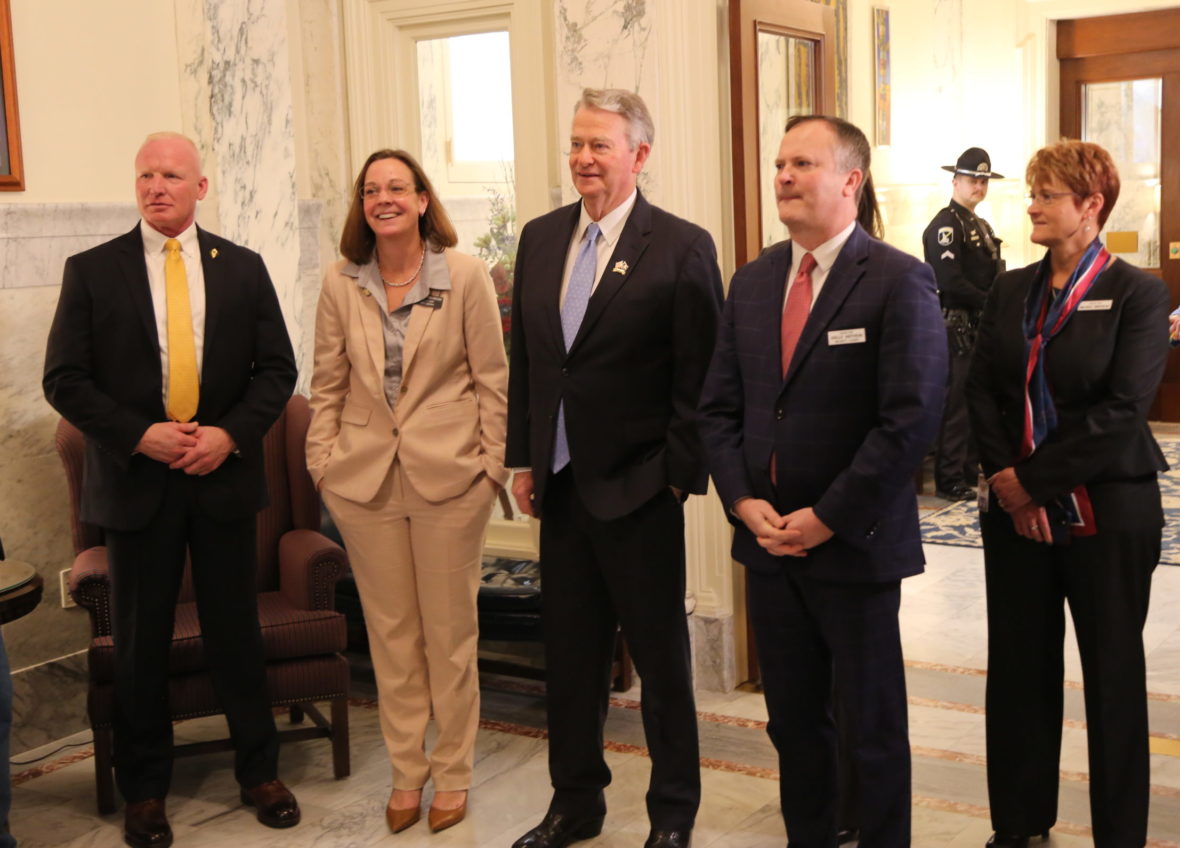
With the state flush with money, Gov. Brad Little is gushing confidence.
In an optimistic State of the State address Monday, Little challenged lawmakers to go big and go bold on public education spending.
It was a hopeful message — often an ebullient one. Little emphasized public education and Idaho’s constitutional and moral obligation to fund schools. Notably, however, he scarcely mentioned school choice.
A State of the State address allows a governor to set a tone and set an agenda.
And to be fair, Little strode into House chambers Monday with plenty of reasons to feel good — and no real incentive to change his playbook.
Two elections from 2022 are behind him. While Little didn’t bring up the numbers, he comes off a pair of blowouts: a 20 percentage point win over Lt. Gov. Janice McGeachin in the GOP primary, a 40 percentage point rout of Democrat Stephen Heidt in the general.
Little’s intraparty feuds with McGeachin are also history. The governor allowed himself a bit of gloating Monday — saying he can now leave the state, knowing that longtime ally and new Lt. Gov. Scott Bedke will commit no theatrics as stand-in governor, save for a speech on water rights.
Little also has $410 million of new money to spend on education — earmarked by the Legislature in September. And while Little didn’t brag up his own election wins, he made sure to mention November’s post-special session advisory vote, which passed with an 80 percent supermajority. “The people’s vote affirming tax relief and our education investments passed in every single county, every single city, and every single legislative district.”
On top of the $410 million, Idaho is riding a $1.5 billion surplus, more than enough to fund property tax relief and a lot of infrastructure.
So, sure, Little was in the mood to flex Monday.
And he showed up ready to push an ambitious education agenda.
- Little’s vision of moving Idaho into the top 10 for starting teacher pay is probably a stretch; 27 states and the District of Columbia paid higher starting salaries in 2020-21, according to the National Education Association. But the proposed $47,447 starting salary represents the centerpiece of Little’s plan to move $145 million into pay raises for all teachers.
- Little proposed a $97.4 million infusion into classified salaries — addressing a recurring concern from superintendents and trustees that continue to struggle to hire bus drivers, IT staff, custodians and cafeteria workers.
- Little wants to provide a one-shot, $8,500 scholarship for high school graduates, for two- or four-year college, career-technical classes or work force training programs. The cost: $80 million.
- Little urged lawmakers to continue his early literacy program, at $72 million a year.
- And Little wants to make the popular Empowering Parents grant program a permanent fixture, at $30 million a year.
Idaho has the money — and, in Little’s view, a “strong mandate.”
But while Little rattled off a far-reaching wish list for public education, he also seemed determined to stop a debate over school choice before it even starts. “Whether it is traditional public schools, public charter schools, public magnet schools, private schools, online academies, or homeschooling, hundreds of schooling options are available to Idaho families.”
The only thing choice-related in Little’s education budget is the continuation of Empowering Parents grants. The grants can pay for any number of things — from counseling to computers — but not private school tuition. And in 2021, lawmakers balked at a proposal to allow parents to use these grants for private school scholarships.
For school choice advocates, who are determined to get a private school scholarship program or an education savings account bill through this Legislature, an Empowering Parents reboot isn’t going to cut it.
This session’s school choice debate is well under way, with or without Little’s participation.
Early Monday morning, Idaho Business for Education hosted Chris Lagoni, executive director of the Indiana Small and Rural Schools Association, who described his state’s voucher program as a drain on small-town schools. Lagoni’s sobering assessment sets the stage for what could be “the most important education debate since statehood,” said IBE chief Rod Gramer, a voucher opponent.
Ninety minutes after IBE broke up its session, state Republican Party chair Dorothy Moon took the podium in the same Statehouse committee room — rallying party faithful to hold GOP lawmakers to the party’s resolutions. That list includes a pro-school resolution. “We want our priorities addressed, not after the lobbyists get their way, but as the first priority,” Moon told an audience of about 100 people, including some of the Legislature’s hardline conservatives.
School choice will be the education story of the session. Alongside property tax relief, school choice looms as the biggest policy debate of the session.
However, there’s a big difference between these two topics.
On Monday, Little readily acknowledged the need for property tax reform. He set aside $120 million in his budget for property tax relief, although he isn’t making a specific proposal. He also urged lawmakers to act now. “Given the economic volatility on the near horizon, this may be our one last shot in the near future to make significant tax cuts that will sustain a balanced budget over time.”
Meanwhile, Little made it clear that he attaches no urgency to school choice. He set an agenda for lawmakers to follow — or not.
Read more, and tune in: Idaho EdNews’ Sadie Dittenber has an in-depth breakdown of Little’s State of the State address and education budget proposal. From Idaho Public Television, here’s the full video of Monday’s address — and reactions from Little’s budget director, Alex Adams; Boise State University professor Stephanie Witt; and Idaho EdNews’ Kevin Richert.
